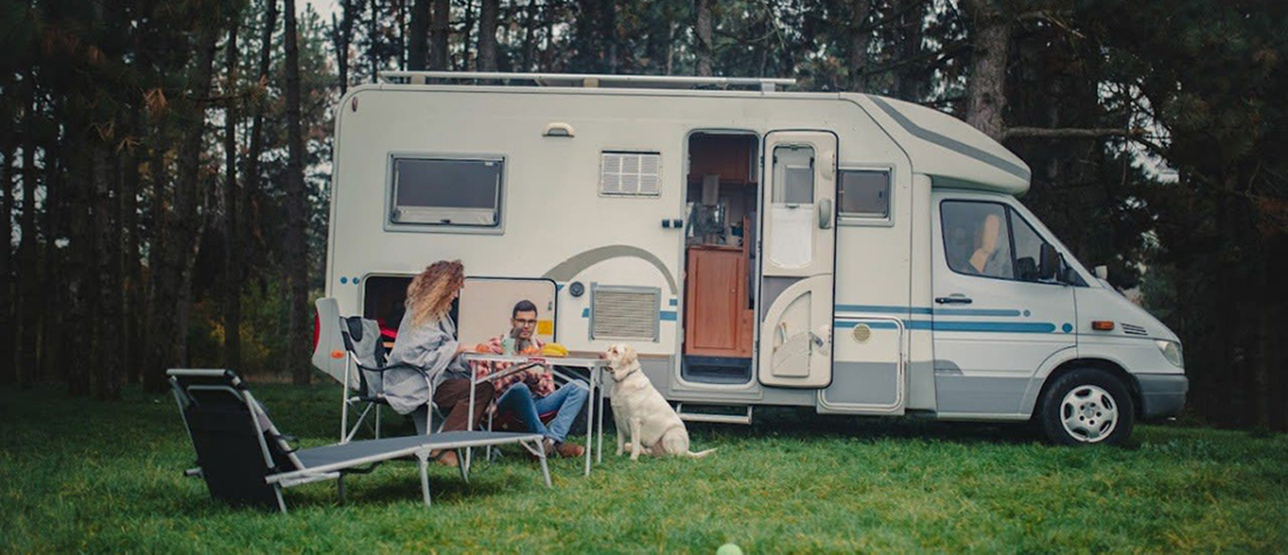Search Youngs Insurance
Recreation Vehicle (RV) & Trailer Insurance

Exploring the great outdoors with a recreational vehicle can be a fantastic way to appreciate the natural beauty of our country. We appreciate that owning an RV is a substantial investment and a source of immense pleasure for many individuals. Nonetheless, accidents do occur, and it's vital to shield your investment and yourself with appropriate insurance coverage.
With our recreational vehicle program that was specifically created for RV'ers, one policy provides all the coverage you need at a competitive price. A variety of trailers qualify for this program, including tent trailers, fifth-wheel trailers, travel trailers and truck campers. Trailers can be up to 40 feet in length.
What Does the Term “Recreational Vehicles” Refer to?
The term recreational vehicle or RV is an umbrella term used for campers, motorhomes, and travel trailers. There are 2 different kinds of RVs, those that are motorized and those that are towable. Motorized RVs are self-contained vehicles you drive and can stay or live in. Towable RVs are units that are towed behind a vehicle. Towable travel trailers, fifth wheels, truck campers, and tent trailers are included in this category.
What is RV Insurance or Motorhome Insurance?
Just like any other form of insurance, RV insurance plays an essential role in minimizing your risk and protecting you in the event of an accident. Because an RV is operated independently, you must carry an auto liability policy. However, RVs come with unique risks due to their size and value. They can range from $30,000 to over $200,000, and you'll want to ensure you can recover the costs in case of a loss. Moreover, RVs are larger vehicles that can cause significant damage and injuries to others or properties, making it crucial to have adequate coverage.Is Motorhome Insurance Mandatory?
Motorhome insurance is mandatory because it is a vehicle. You can have a stand-alone insurance policy or add the motorhome to your auto insurance policy.
Do I need to Insure My Towed RV Trailer?
Travel trailers and towable RVs are not considered to be motorized vehicles, so they do not require their own auto insurance policy. The liability coverage from your auto insurance policy extends to the trailer while the trailer is attached to your vehicle. Depending on the value of your trailer, you may want to speak with your insurance broker about adding collision and comprehensive coverage to your auto policy.
*It is important to note that liability coverage does not extend from your auto policy if your trailer is unhooked from your vehicle. If you are looking to insure your trailer while unhooked from your vehicle, some insurance companies may require you to add the trailer to your home insurance policy as a vacation trailer.
How Much Does RV Insurance Cost?
The cost of your RV insurance will depend on:
- Class of RV. Class A RVs are often the costliest to insure, due to their high value.
- RV usage
- Your driving history
- Any additional coverages you may choose to add to your RV insurance policy

RV Classes
Motorized RVs are typically categorized into 3 classes, Class A, Class B, and Class C. Class A RVs are typically the largest, ranging from 24 to 45 feet long. Class B is typically the smallest, ranging from 16-21 feet and Class C is typically the middle size between Class A and B, ranging from 21-36 feet.
Type A Coverage
This type of insurance is for recreational vehicles that you are driving to a destination. Type A coverage will offer you protection for emergency expenses, liability coverage, all perils, personal property protection, and depreciation waiver.
Type B Coverage
This kind of RV insurance is an add-on coverage that is for travel trailers, truck campers, tent trailers, and fifth-wheel trailers. This type of coverage adds comprehensive or collision coverage.
Other RV Insurance Coverage Options
Emergency Roadside Service:
Emergency Roadside Service Coverage can help you with flat tires, battery boosting, towing, and more roadside assistance services.
Emergency Vacation Expense:
Emergency Vacation Expense Coverage may cover you if your RV is inoperable due to a covered loss. It can help to cover the costs to help you get home, complete your vacation, or live outside your RV while it is inoperable.
Campsite Liability:
Campsite Liability Coverage may cover costs towards property damage that has been caused to a campsite due to your RV. This type of coverage is designed for people on short vacations.

Personal Effects Replacement Coverage:
Comprehensive coverage helps to protect your RV from the result of mechanical and physical damage to the unit, as well as items that are directly built into your RV. Personal Effects Replacement Coverage provides added protection for contents that are not built into your RV, such as a TV, clothes, or housewares. If you need to repair or replace items from inside your RV that have been damaged or lost in a claim that has been deemed covered, this type of coverage may help to cover those costs.
One fully loaded Motor Home package that includes:
- $2 Million Liability coverage
- All perils coverage with deductibles starting at $300
- $7,500 in personal property coverage
- $2,500 Loss of Use/Emergency Vacation Expense
- 10-year waiver of depreciation coverage for units that qualify
- A variety of discounts are available
Trailers
One fully loaded Trailer program that includes:
- $2 Million in Liability coverage
- All perils coverage with deductibles starting at $300
- 20% of trailer insurance value in personal property coverage
- $2,500 Loss of Use/Emergency Vacation Expense
- 10-year waiver of depreciation coverage for units that qualify
- A variety of discounts are available

